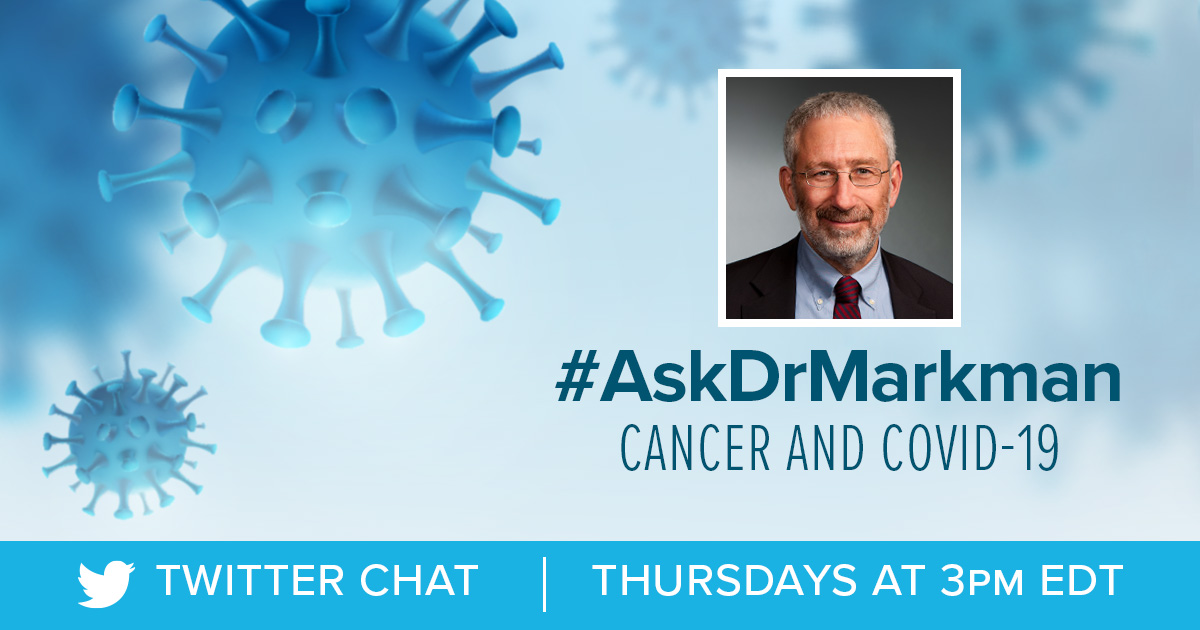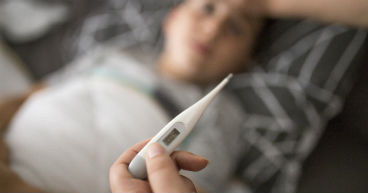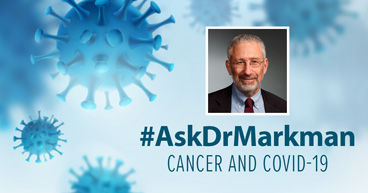
The COVID-19 pandemic has created a landscape of constantly evolving developments and new and sometimes confusing information. Cancer patients have many questions about how COVID-19 may affect them, their treatments and their overall health. In his weekly Q&A hosted on Twitter, Maurie Markman, MD, President of Medicine & Science at Cancer Treatment Centers of America® (CTCA), answers your questions in real time and as questions are sent to us online and by phone. Follow us on #AskDrMarkman. Here’s this week’s chat:
Question: I’m receiving immunotherapy to treat my cancer, and I’m concerned about getting a flu vaccine this fall. Should I get one?
Answer: A recent study found no difference in the risk of side effects associated with cancer immunotherapy between patients who received the flu vaccine and those who didn’t. With COVID-19 likely a continuing concern during the upcoming flu season, it’s more important than ever that people at high risk, including cancer patients, get the flu vaccine. It’s the one of the best preventative steps you can take to avoid getting sick.
Q: I am participating in a cancer clinical trial, but I’m not able to travel to my next scheduled appointment. What should I do?
A: You may still be able to reschedule in-person visits, laboratory tests and radiology procedures while continuing the clinical trial. You should talk to your oncologist about available options and when it would be appropriate for you to travel to an appointment.
Q: As a cancer patient, will I be allowed to participate in a COVID-19 vaccine trial?
A: Generally speaking, it depends on where you are in your cancer treatment journey. If you have completed active therapy, and your care team is confident that the cancer or the treatment has not compromised your immune system, it may be deemed appropriate that you participate in the trial. But it’s very important that your safety is not compromised in any way by participating in a vaccine study or any clinical trial, so it’s critical to discuss this option with your oncologist.
Q: I saw on the news that WHO is saying that having a COVID-19 infection did not necessarily mean someone is immune from getting the virus again. Is this true?
A: Yes, this is correct. Because the virus is a so new, little is known about how or whether a prior infection can prevent future COVID-19 infections. People infected with viruses similar to COVID-19 have seen some immunity to future infections, so it’s certainly reasonable to speculate that this will be the situation with COVID-19. But more data is needed. How long such immunity would last is also unknown.
Q: I’m a breast cancer patient, and I have a BRCA mutation. Does this make me more or less susceptible to a COVID-19 infection?
A: There is currently no evidence that the presence of any particular genetic profile, including the presence of a cancer susceptibility gene like BRCA, will make someone more or less vulnerable to COVID-19 infection. It’s possible that future research may find that a unique genetic profile may influence the response to a COVID-19 infection. Or researchers may discover that a particular drug used to treat the virus, after being metabolized in the body, may be influenced by specific modifications in our genes. But no data is available yet.
Q: Are cancer patients more likely to die from COVID-19 infections than people without cancer?
A: Relatively limited studies of the early experience of COVID-19 patients vs. those without cancer suggest that having active cancer is a risk factor for a more serious infection with this virus. But it’s still unclear if these results have more to do with other risk factors—cancer patients are typically older and some are frail—or if it’s the treatment itself that raises the risk. Future research should answer those questions.
Q: I’ve been told that antibody tests used to determine if someone has had a COVID-19 infection are not very reliable. Is this true?
A: Much is still unknown about the meaning of antibody testing results for COVID-19 infection, including how many antibodies are needed for at least some short-term immunity to a future infection. Today, it’s probably fair to say that a positive COVID-19 antibody test likely indicates the person had a prior infection, but if it’s negative, it doesn’t necessarily mean the individual tested isn’t currently infected or hasn’t been infected in the past. This is particularly relevant if the individual with the negative test result has viral-like symptoms and has recently been exposed to a known COVID-19 patient. In this case, that individual should assume she/he is infected and consider getting retested.
Q: I’ve read that the government is pushing for a COVID-19 vaccine to be made available quickly, possibly as soon as the end of this year. Is that realistic?
A: This is an important question, but it’s difficult to answer. Most scientists with expertise in this area have suggested it will take longer than that to develop and subsequently prove both the safety and effectiveness of a viral vaccine. However, an impressively large number of potentially promising vaccine candidates are now being rapidly investigated, including some in early-phase human clinical trials. If one (or more) of these vaccines appears to be highly active against COVID-19 and is confirmed to be safe, it’s certainly possible this process can be expedited.
Q: My friend, who is a long-term smoker, told me smokers have a lower risk of a serious COVID-19 infection. Is this true?
A: Several early reports have suggested smokers may have a lower risk of serious COVID-19 symptoms, but not that they specifically have a lower risk of contracting the virus. The theory is that nicotine may decrease excessive viral-induced inflammation, a hypothesis that’s leading investigators to further study the relationship between COVID-19 and tobacco products. Conversely, though, it’s critical to note that smokers with underlying lung damage may have a substantially heightened risk of serious lung complications from COVID-19.
Q: I know having cancer and being in active treatment raises the risk of contracting COVID-19 and experiencing serious symptoms. But what if I no longer have cancer and am not in treatment? Do prior treatments raise my risk? Does it matter how long ago I had them?
A: There is no current evidence that a history of being treated for cancer in the past increases the risk of developing a COVID-19 infection or experiencing severe symptoms, assuming the individual has fully recovered from any harmful effects of treatment and does not have other factors that may increase that risk.
If you are a cancer survivor or in active treatment and are concerned about how the COVID-19 situation may impact you or your care, please contact your care team.
Learn how new hospital COVID-19 guidelines may improve access to cancer care.



